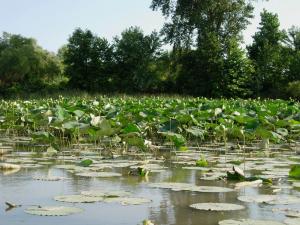May 4 (UPI) — New research suggests bodies of freshwater are likely to release more methane in the atmosphere as the makeup of surrounding vegetation changes.
According to the study, published in the journal Nature Communications, tree debris works to suppress methane production in lakes and ponds, while the decomposing plant materials from marsh grasses and reed beds promote methane production.
Studies suggest wetland plants will gain an advantage as the climate warms, thus accelerating methane emissions in freshwater ecosystems.
Freshwater ecosystems currently account for approximately 16 percent of the Earth’s methane. Authors of the latest study expect that number to grow as the planet gets hotter.
“We believe we have discovered a new mechanism that has the potential to cause increasingly more greenhouse gases to be produced by freshwater lakes,” Andrew Tanentzap, a botanist at the University of Cambridge, said in a news release. “The warming climates that promote the growth of aquatic plants have the potential to trigger a damaging feedback loop in natural ecosystems.”
The majority of methane produced by freshwater lakes is produced as a byproduct of the decomposition of plants that grow in or near the water. When debris is subsumed by sediment at the bottom of the body of water, microbes begin eating the dead plant material, producing methane as they do. The methane bubbles rise to the surface and escape into the atmosphere.
Researchers recreated this process in the lab, using sediment amended with three different types of plant debris. The sediment amended with cattails, common in reed beds, yielded 400 times more methane than sediment amended with coniferous tree debris and 2,800 times more methane than sediment amended with deciduous tree debris.
Scientists used their data to model methane production in Canada. They found that if the common cattail colonized half of the lakes in Canada, methane emissions in the region would rise by 73 percent.
“Accurately predicting methane emissions is vital to the scientific calculations used to try and understand the pace of climate change and the effects of a warmer world,” Tanentzap said. “We still have limited understanding of the fluctuations in methane production from plants and freshwater lakes.”

COMMENTS
Please let us know if you're having issues with commenting.